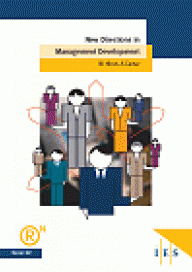Publications
 We author and publish a range of resources to keep you up to date with the latest developments in employment, labour market and human resource policy and practice.
We author and publish a range of resources to keep you up to date with the latest developments in employment, labour market and human resource policy and practice.
All our pdf publications are free to access.
-
📄
Employers Skill Survey 2002
Hillage J, Regan J, Dickson J, McLoughlin K | Aug 2002 | Department for Education and SkillsThe 2002 Employers Skill Survey is the third in a series designed to investigate the extent, causes and implications of skill deficiencies in England. It is based on a structured sample of 4,000 telephone interviews with employers with five or more employees in the nine English regions, conducted between January and March 2002.
-

E-Work in Ireland
Bates P, Bertin I, Huws U | Jul 2002 | Institute for Employment StudiesThere are many types of e-working, ranging from large, transnational contracts between organisations to local use of self-employed 'e-lancers'. E-working also facilitates various types of business outsourcing, an issue that has previously received little attention. To what extent are Irish organisations making use of this potential to relocate work? Which remote sites are being selected? What are the criteria used for selecting them? How does Ireland compare with other European countries in its use of e-work? And is Ireland an attractive destination for e-work originating from organisations in other countries?
-
📄
July 2002 Graduate Salaries and Vacancies Half Yearly Review
Barber L, Regan J, Papworth R | Jun 2002 | Association of Graduate RecruitersIES continued its work for the Association of Graduate Recruiters with this edition of the twice-yearly survey for AGR Members. The report is free to AGR members and can be ordered directly from the AGR.
-

Jobs on the Move
European Case Studies in Relocating eWork
Flecker J, Kirschenhofer S | Jun 2002 | Institute for Employment StudiesIn 2001 the EMERGENCE team carried out 62 case studies in 18 European countries, of organisations which had relocated or outsourced work to remote sites using new technologies. Each case study consisted of a 'source' in one region and a 'destination' in another region or country. Eight distinct types of relocation are identified. Many factors are involved in the choice of location, and successful relocation depends on technological, organisational and social factors. Relocation places considerable demands on personnel at both source and destination organisations and may require a complete overhaul of business processes.
-

Modelling eWork in Europe
Estimates, models and forecasts from the EMERGENCE project
Bates P, Huws U | Jun 2002 | Institute for Employment StudiesThis report draws on the results of the EMERGENCE 18-country employer study and combines them with data from European labour force surveys to develop models of eWorking. Four distinct types of 'individual' eWorkers are identified in the study: telehomeworkers, multilocational eWorkers, eLancers, and the eEnabled self-employed. The EMERGENCE team has developed forecasts for the spread of each of these individual forms of eWork over the next decade.
-
📄
What Difference Did it Make?
Impact of the Adult and Community Learning Fund
Tyers C, Aston J | Jun 2002 | National Institute of Adult Continuing EducationThis document presents research designed to evaluate the Adult and Community Learning Fund. A key aim of the research was to examine the impact of the ACLF on the organisations involved, the individuals taking part in learning activities, and the communities which the Fund was designed to serve.
-

New Directions in Management Development
Hirsh W, Carter A | May 2002 | Institute for Employment StudiesThere is widespread acceptance of the importance of management development, but still much uncertainty about how it can be most effectively delivered to the diverse management population. This IES analysis shows that there is still a need to set clear corporate and operating unit priorities for management development.
-
📄
The IES Annual Graduate Review, 2002 update - Part 1: Higher Education: the New Status Quo
Perryman S | May 2002 | Institute for Employment StudiesNot published as a bound report in 2002, this year's report appears in the form of two summary updates: Part 1: Higher Education: the New Status Quo and Part 2: Graduates' Early Careers.
-
📄
Costs and Benefits to Service Providers of Making Reasonable Adjustments under Part III of the Disability Discrimination Act
Meager N, Dewson S, Evans C, Harper H, McGeer P, O'Regan S, Tackey N D | May 2002 | Department for Work and PensionsThis report presents the findings of a UK-wide survey and case studies of service providers in scope of Part III of the Disability Discrimination Act. The research examines the extent to which establishments are making reasonable adjustments for disabled customers under Part III of the Act, and the costs and benefits of making such adjustments.
-
📄
The IES Annual Graduate Review, 2002 update - Part 2: Graduates' Early Careers
Perryman S | May 2002 | Institute for Employment StudiesNot published as a bound report in 2002, this year's report appears in the form of two summary updates: Part 1: Higher Education: the New Status Quo and Part 2: Graduates' Early Career.
